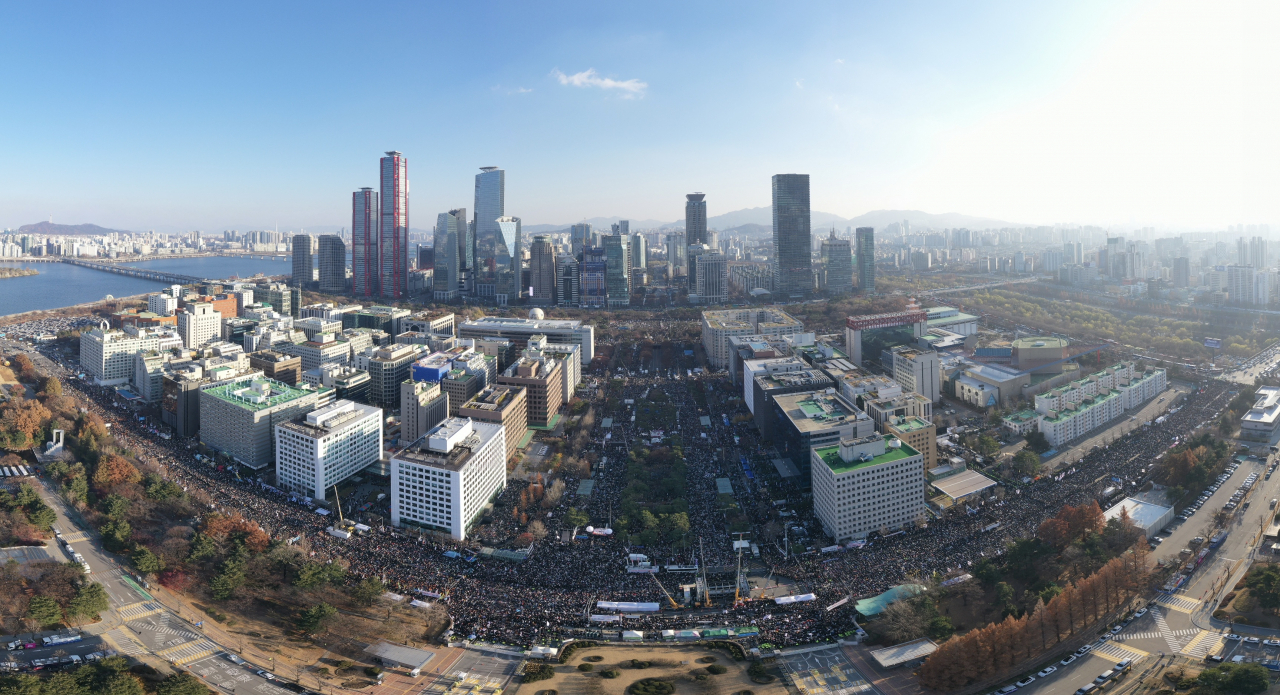Economy
Political uncertainty weighs on Korea’s credit rating
 |
Protesters demand President Yoon Suk Yeol's impeachment in front of the National Assembly in Yeouido, western Seoul on Saturday. (Newsis) |
The political turmoil surrounding President Yoon Suk Yeol has begun to subside since the National Assembly passed the motion to impeach him on Saturday, but the uncertainty in state leadership continues to weigh on the country’s sovereign credit rating.
Shortly after the fiasco caused by Yoon’s martial law declaration earlier this month, three major global credit appraisers -- Moody's Ratings, Fitch Ratings and S&P Global Ratings -- warned that prolonged political instability could negatively affect the country’s credit rating, a gauge of a country's ability and willingness to pay its debts.
The political uncertainty will remain a liability for the country, according to a senior executive at Moody’s, although lawmakers' move to unseat the president prevented a further escalation of the crisis.
“Following the parliamentary vote to impeach President Yoon, Korea is likely to see continued political uncertainty until the Constitutional Court decides whether to remove him from office or restore his powers,” Anushka Shah, vice president and senior credit officer at Moody’s Ratings told The Korea Herald.
Since December 2015, Moody's has maintained the country's sovereign credit rating at Aa2, the third-highest level.
“We recognize that strong rule of law continues to underpin swift decision-making, and that all other institutional functions -- including monetary and fiscal policy -- remain effective,” Shah said.
“However, delays or complications until the judiciary reaches a decision may result in a prolonged disruption to economic activity, including work stoppages, and that would be credit negative.”
Korea has maintained a relatively high sovereign credit ranking from the other two agencies as well. Fitch has kept its rating for Korea at the fourth-highest level of AA- since September 2012, and S&P has kept its long-term sovereign credit rating for Korea at AA, the third-highest notch, since 2016.
But as mentioned by Shah, the country’s ongoing political instability could lead to downgrades.
For instance, Moody's pulled down France's credit rating from Aa2 to Aa3, its fourth-highest level, on Saturday over concerns of “political fragmentation.” It said the country’s public finances will be “substantially weakened” over the coming years by the political turmoil.
S&P already lowered France’s rating by a notch in June, and Fitch is likely to follow suit in the coming weeks, having issued a warning in October.
Aware of such concerns, Finance Minister Choi Sang-mok has been holding a round of meetings with global credit appraisers to reassure them.
Experts say the recent political instability could provide grounds for global appraisers to cut the country’s ratings, which have weakened due to the rising fiscal debt in recent years.
“Korea’s credit ratings were upgraded in the 2010s when the local authorities put in all efforts to raise them. But ever since, the country’s fiscal debt has sharply risen, putting its chances of maintaining its sovereign ratings at risk,” said Lee Hyo-seob, senior research fellow at Korea Capital Market Institute.
“Sovereign ratings are a combination of quantitative and qualitative factors. The credit agencies would have to justify a downgrade if it was to happen, and the current instability provides the quantitative justification.”
By Im Eun-byel (silverstar@heraldcorp.com)








